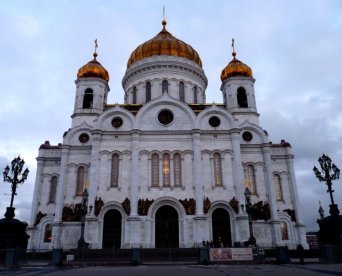- About
- Topics
- Picks
- Audio
- Story
- In-Depth
- Opinion
- News
- Donate
- Signup for our newsletterOur Editors' Best Picks.Send
Read, Debate: Engage.
| located: | Russia |
|---|---|
| editor: | Igor Serebryany |
The Russian Orthodox Church has been building three churches a day, bringing the total number of the temples to 30 thousand, Patriarch Kirill said. If the number announced by Kirill is correct, this means that the pace of church construction outstrips the pace of construction of schools and health facilities in this is country multi-fold.
The speed of church-building has been so astonishingly high that even President Vladimir Putin advised Kirill earlier this week to slow down.
Tense relations between Russian secular and spiritual leaders has not been a secret, renown archdeacon Andrei Kuraev says. According to Kuraev, the reason behind the tension has not been due to some personal dislike between the two men but of a much wider scale. "This is a sort of subtle Byzantism: Putin expects that Kirill would understand his hints and follow the example of Pope Benedict. Or, perhaps, this is a way to let Patriarch render to Caesar the things that are Caesar's. There's a strong feeling in Russia that Kirill has somehow lost a sense of moderation. Russian Church repeatedly demands from the state to give it more powers, more benefits, more money and so on", Kuraev says. He believes that the church's aggressive construction projects begin to worry the state authorities because the number of existing and planned temples exceeds the "market capacity".
"Still, Patriarch believes the number of churches has been too small per capita. It looks like he wants that every Russian citizen would have his or her personal church," Kuraev sneers.
The pace of church construction might cause a public reaction opposite to what the Church expects, head of the Center for Ethnic and regional studies Emil Pain says. "In a Moscow district where I live, there are four temples and only one walk-in clinic. Such a proportion between the earthly and heavenly annoys people, even the believers. The objective of the church speed construction is to calm public tension caused by the deterioration of the living conditions in Russia. But the Church could invest the money into some public facilities like health centres", Pain suggests.
The society must grow in harmony with both spiritual and everyday needs satisfied, and the question is if such harmony exists in the modern Russian society, an expert in religious affairs in Moscow Human Rights Bureau Yuri Tabak says. "From the point of view of a non-religious person, the program of erecting several hundred churches in Moscow looks excessive. For a religious person that looks differently, of course. But the thing is, that in modern Russia the number of actual religious people hovers around five percent of the population", he says. Tabak adds that there are people for whom the temple is more important than a clinic. But even a religious person, when falling ill, first goes to a doctor, not to a priest, the expert points out.
Naturally, the Church can't build roads and schools so it invests in what is possible for it. "But when the Russians see that their local authorities contribute public funds to church construction instead of investing money into ailing housing and utilities, that annoys people", Tabak stresses.
Photo Dudva, CC BY-SA 3.0
